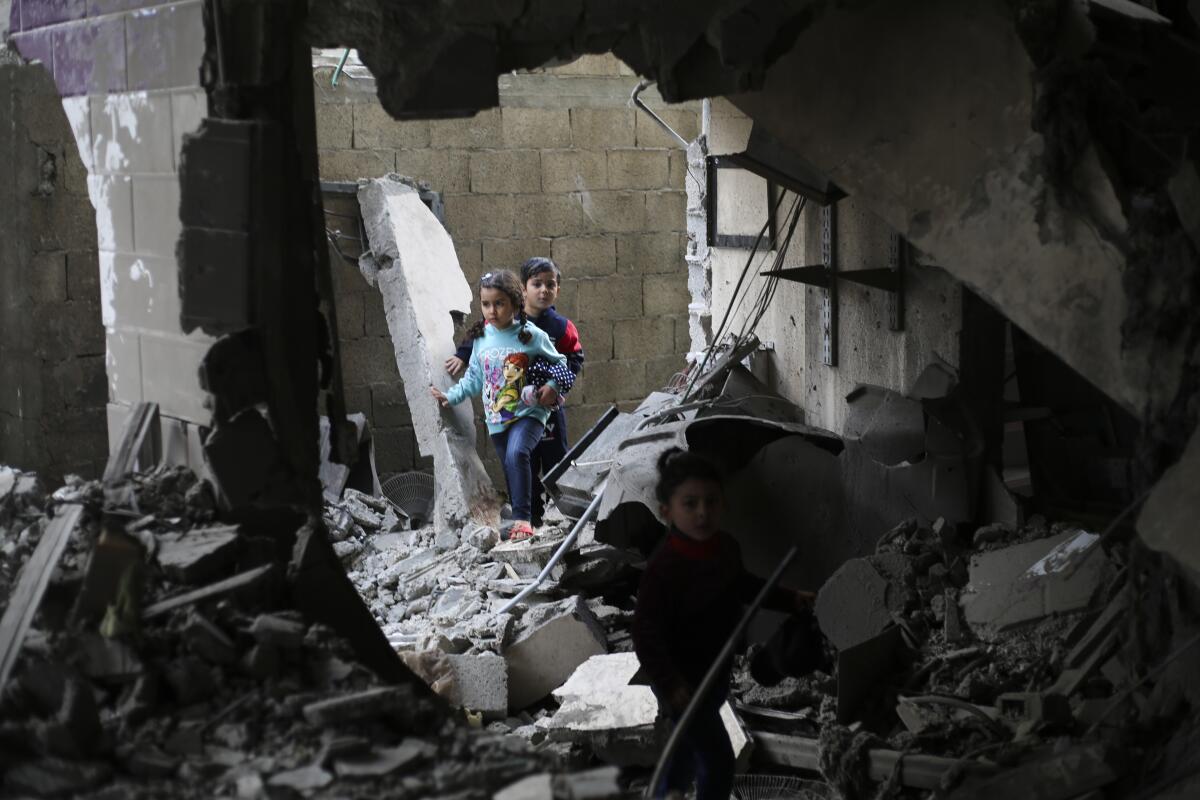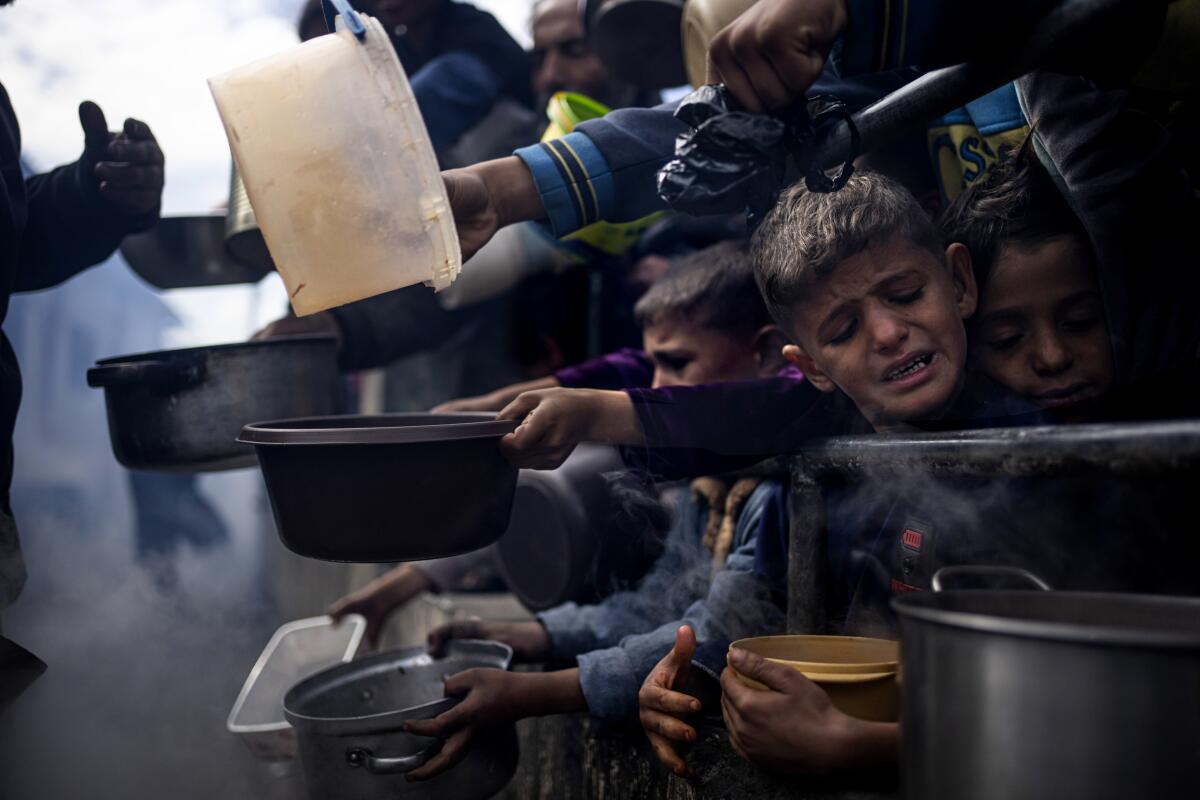What are the limits of empathy in war?
That’s the question that Joanna Chen, a liberal writer and translator who is Jewish and lives in Israel, probed in an essay about her struggles since Oct. 7 to connect with Palestinians.
“It is not easy to tread the line of empathy, to feel passion for both sides,” she wrote in the literary journal Guernica, explaining that she briefly stopped her volunteer work driving Palestinian children to Israeli hospitals for lifesaving medical care.
“How could I continue after Hamas had massacred and kidnapped so many civilians,” she asked, noting that the dead included a fellow volunteer, a longtime peace activist named Vivian Silver. “And I admit, I was afraid for my own life.”

Palestinian children look at damaged buildings after an Israeli strike on a residential area of Rafah, Gaza Strip, on Dec. 14.
(Hatem Ali / Associated Press)
The essay, titled “From the Edges of a Broken World,” provoked an uproar in the activist literary world. Over the weekend, more than a dozen of the publication’s staff resigned in protest — and Guernica removed the essay from its website.
“Guernica regrets having published this piece, and has retracted it,” the magazine said in a statement. “A more fulsome explanation will follow.”
Among those who quit was the co-publisher, Madhuri Sastry, who wrote on X that the essay was “a hand-wringing apologia for Zionism and the ongoing genocide in Palestine.”
Sastry also called for the resignation of the editor in chief, Jina Moore Ngarambe, a veteran foreign correspondent. Ngarambe did not respond to requests for comment.
In a statement to The Times on Tuesday, Chen said: “Removing any stories and silencing any voices is the opposite of progress and the opposite of literature.”
“Today, people are afraid to listen to voices that do not perfectly mirror their own,” she said. “But ignorance begets hatred. My essay is an opening to a dialogue that I hope will emerge when the shouting dies down.”
The retraction of the essay comes as a new generation of activists in the literary world frames the conflict in the Middle East as a black-and-white battle between two sides — oppressor and oppressed — and pressures institutions to boycott Israeli or Zionist writers.
In January, protesters from Writers Against the War on Gaza disrupted a PEN America event in Los Angeles featuring actor Mayim Bialik, who supports Israel and opposes a cease-fire. Last month, the Jewish Book Council, a nonprofit that promotes Jewish writers and stories, launched an initiative for authors, publishers, agents and others to report antisemitic incidents in the world of publishing — from “getting review-bombed because their book includes Jewish content” to “threats of intimidation and violence.”
For many activists, giving voice to opposing points of view or conveying empathy for Israeli victims of Hamas amounts to both-sidesism that glosses over power imbalances. Israel says that Hamas killed about 1,200 people on Oct. 7, prompting an invasion that authorities in Gaza say has killed more than 31,000 people.
On X, Guernica’s former fiction editor, Ishita Marwah, slammed Chen’s essay as a “rank piece of genocide apologia” and condemned Guernica as “a pillar of eugenicist white colonialism masquerading as goodness.”
Grace Loh Prasad, a Taiwanese-born writer based in the Bay Area who published an excerpt of her new memoir in Guernica last week, wrote: “I am alarmed & upset that my writing has appeared alongside an essay that attempts to convey empathy for a colonizing, genocidal power.”
Hua Xi, Guernica’s former interviews editor, singled out a passage in which Chen describes a neighbor telling her she tried to calm her children who were frightened by the sound of military planes flying over their house: I tell them these are good booms.
Chen writes: “She grimaced, and I understood the subtext, that the Israeli army was bombing Gaza.”
For Xi, quoting an Israeli calling bombs “good booms” undermines Guernica’s “premise that they are holding space for Palestinian writers.”
Rather than just disagree, these activists are calling for the silencing of voices they view as harmful.
On social media, an activist accused Chen of “both-sidesing genocide.” Another condemned Chen, who was born in Britain and moved to Israel with her parents when she was 16, as “a settler who has settler genocidal friends and raised settler genocidal children.”
Established in 2004 amid the U.S. invasion of Iraq, Guernica was founded as an unabashedly antiwar, anti-imperialist publication, according to one of its founders, Josh Jones.
The journal took its name from a Lower East Side bar where two of the founders participated in a reading series, and Picasso’s iconic painting depicting the horror of the 1937 bombing of the Basque town in northern Spain.
Guernica’s leaders did not always agree on what it meant to be antiwar — particularly as a growing wave of pro-Palestinian activists called for not platforming pro-Israeli voices.
Sastry wrote on X that over the last few months she urged Guernica’s leaders to “commit to cultural boycotts” organized by pro-Palestinian activists. They disagreed, she wrote, telling staff in an email that “Guernica’s political projects can be found in what we publish.”
For the record:
8:23 a.m. March 13, 2024An earlier version of this article said Madhuri Sastry flagged concerns about a Joanna Chen story published in Guernica’s “Voices on Palestine” compilation. The story was published but not included in the collection.
But Sastry did not always like what the magazine published. Even before this week, she said, she raised concerns about a previous story by Chen that was being considered for the magazine’s “Voices on Palestine” compilation. It was ultimately excluded.
At the same time, Guernica’s editors received complaints that their magazine lacked a complexity of voices and was too pro-Palestinian.

Palestinians line up for food in Rafah, Gaza Strip, in February.
(Fatima Shbair / Associated Press)
Emily Fox Kaplan, an essayist and journalist who is Jewish and has written for Guernica since 2020, wrote on X that “the only mistake Guernica made was not publishing a wide variety of voices” on the Israel-Palestinian issue “from day one.”
“The problem, when it really comes down to it, is that it presents an Israeli as human,” Kaplan wrote of Chen’s essay. “The people who are losing their minds about this want to believe that there are no civilians in Israel. They want a simple good guys/bad guys binary, and this creates cognitive dissonance.”
Other writers accused activists who attacked Chen’s essay of “bareknuckled antisemitism” and Guernica of “taking its cue from Joe McCarthy and MAGA book burners.”
“God forbid someone might think Israelis are complex human beings, and not just demons,” said Lahav Harkov, a senior political correspondent at Jewish Insider.
Chen said in her statement to The Times that she did not realize the essay was sparking more than usual criticism until Saturday evening when a friend texted to alert her that one of the Guernica editors had resigned. She reached out to the editor in chief that evening and they spoke briefly Sunday morning.
“Since then, nothing,” she said.
“Guernica claims to be ‘a home for singular voices, incisive ideas, and critical questions’ but apparently there is no longer space in this home for a real conversation,” Chen said. “But I do not regard this as a missed opportunity: my words are being read and the door is still, in fact, open.”
Her essay, which is available on the Internet archive, Wayback Machine, offers a personal account of living in Israel before and after Oct. 7.
She wrote that she struggled to assimilate when she moved to Israel. Two years later, at 18, she chose not to serve in the Israel Defense Forces. Besides her volunteer work with Road to Recovery, which provides transportation for Palestinian children to hospitals, she describes donating blood to the people of Gaza. She also translated and edited the poems of Palestinian poets, believing their voices were “just as important” as the voices she translated from Hebrew.
After Oct. 7, Chen wrote, “I listened to interviews with survivors; I watched videos of atrocities committed by Hamas in southern Israel and reports about the rising number of innocent civilians killed in a devastated Gaza.”
She described holding a space in her mind for the victims in both Israel and Gaza: “At night, I lay in bed on my back in the dark, listening to rain against the window. I wondered if the Israeli hostages underground, the children and women, had any way of knowing the weather had turned cold, and I thought of the people of Gaza, the children and women, huddled inside tents supplied by the UN or looking for shelter.”
When a fellow volunteer expressed anger that Palestinians she had helped did not reach out after Oct. 7, Chen did not take sides.
“The Palestinians in the West Bank were struggling with their own problems: closure, the inability to work, the threat of widescale arrests being made by the Israeli army, and harassment by settlers,” she wrote. “No one was safe.”
Two weeks after Oct. 7, Chen writes, she resumed volunteering for Road to Recovery, ignoring her family’s fears for her safety, and drove a Palestinian boy and his father to an Israeli hospital. When they exited her car and the child’s father thanked her, she wrote, she wanted to tell him: “No, thank you for trusting me with your child. Thank you for reminding me that we can still find empathy and love in this broken world.”
For activists who object to the very existence of Israel, Chen’s liberal framing — and refusal to take a stance — is inherently problematic: They say that the focus on finding empathy and love in a broken world ultimately justifies the status quo.
In her critique of the essay, April Zhu, former senior editor for interviews, wrote the essay starts “from a place that ostensibly acknowledges the ‘shared humanity’ of Palestinians and Israelis, yet fails or refuses to trace the shape of power — in this case, a violent, imperialist, colonial power — that makes the systematic and historic dehumanization of Palestinians … a non-issue.”
Some argued that Chen’s liberal perspective was more problematic than any conservative voice.
“I find open warmongering less nauseating than this sort of self-pitying faux-bleeding heart claptrap,” wrote an independent filmmaker from L.A. “The fascist propagandist is at least honest. The liberal propagandist never shuts up about how tormented they are by the terrible *complexity* of it all. Get over yourself.”

